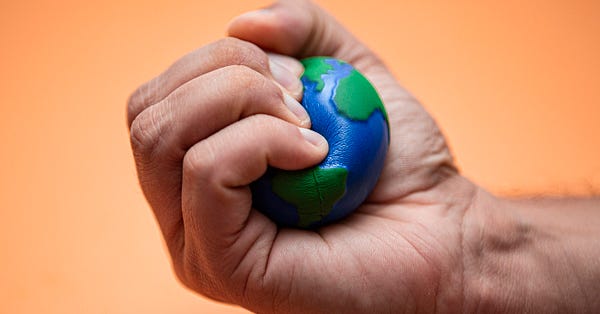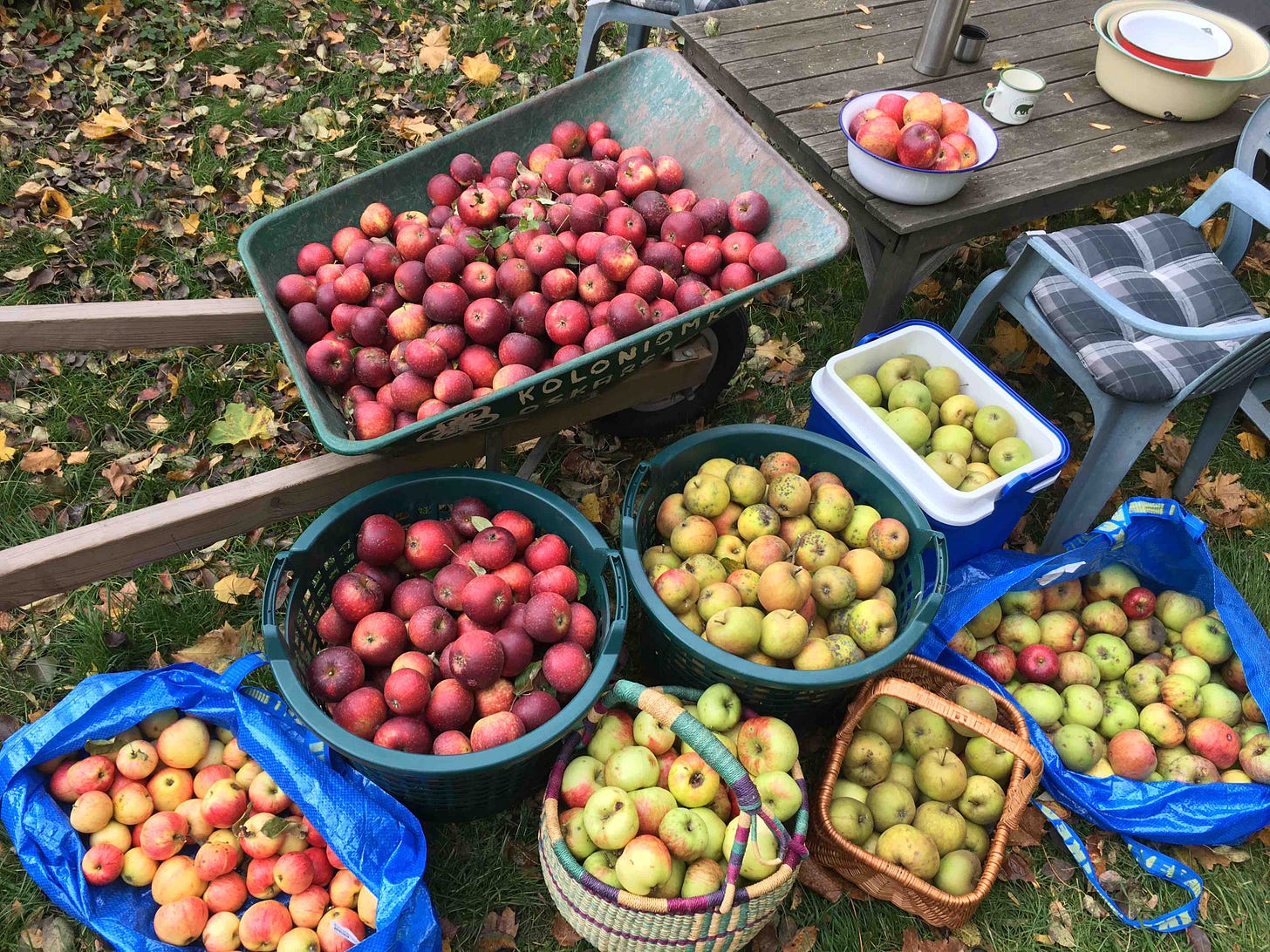Your Top 5 Climate Superpowers
Facts: Your top 5 climate superpowers; Feelings: Don't worry about climate worry; Action: Join our first Discussion Thread November 9!
Hi friends, welcome to decorative gourd season, and to We Can Fix It: your friendly expert guide to making high-impact climate action happen throughout your life, armed with a healthy dose of facts and feels.
If you’re new, click this button to join the team. And away we go!
Facts: Your Top 5 Climate Superpowers
This month, the hot-off-the-press climate facts come from yours truly! With lovely colleagues in a team led by Kristian Nielsen, our new study in Nature Energy shows how the global movers and shakers can either:
(a) continue to lock in climate catastrophe, or
(b) lead the transformation to a stable climate. (Let’s choose this option!)
In the study, my colleagues and I look at the super-rich “polluter elite”. But we’re also looking at ourselves, because our college education, white-collar jobs, prosperous neighborhoods, and income over $38,000 a year means we (and maybe you?) are of “high socio-economic status” globally.
This status gives us disproportionate power and responsibility that will be critical for averting catastrophic climate change.
The takeaway: there are five key roles where your actions can have outsized impact: as consumers, investors, role models, as part of organizations, and as citizens.

Kristian and I summarized the 5 roles in a comment for New Scientist. Key highlights:
Consumer
“The group earning over $38,000 a year makes up the top 10 per cent of income globally, and is responsible for half of the carbon pollution emitted by households. As you ascend the income scale to $109,000, you reach the global 1 per cent, whose individual climate pollution is 30 times above the sustainable limit for 2030.
The majority of this climate pollution is created through frequent and long-distance travel by plane and car, followed by home energy use.” (Reminder from We Can Fix It July 2021: here’s how to align your consumption with climate.)
Investor
“If you have a pension, or savings in investment accounts at a major bank, chances are you are currently financing climate destruction via loans and investments to expand and support fossil fuel pipelines and power plants. To support climate stability instead, shift your money from banks and pension funds and stocks that still finance fossil fuel companies. Support campaigns to get universities, schools and businesses to divest from fossil fuels.”
Role model
“Social influence increases with status, but we all influence those around us through our words and, especially, our actions. We can use this influence with family, friends, neighbours and colleagues to promote climate-friendly aspirations and norms in our networks and communities. One simple way to wield this influence is through shifting social media posts away from celebrating conspicuous consumption of tropical holidays and fat steaks, and towards simpler pleasures of time with family and friends and in nature closer to home.”
At work or school
“You can also press for climate action in the organisations where you work, play or study. Speak up for and drive policies for decarbonising industries and supply chains, and advocating for philanthropy. The recent Project Drawdown guide Climate Solutions at Work offers practical advice on how to make every job a climate job, while the Science Based Targets initiative sets pathways for companies to do their fair share to meet the goals of the Paris Agreement.”
Citizen
“As citizens, voting is a powerful climate action. Those of us lucky enough to live in the 18 per cent of countries that meet high democratic standards should use this power. Until now, political access and influence have mainly been used to promote fossil fuel and other corporate interests in policy-making. This can change by making climate a leading political and election issue through social mobilisation and lobbying, and by holding representatives accountable for their climate votes and directly contacting them, especially as many representatives report feeling very little pressure from their constituents to take climate action.”
Want more? Read the study in Nature Energy, the full comment piece by me and Kristian quoted above, or some of the press coverage of the work:
BBC // Forbes // Grist // Dagens Nyheter (Swedish) // Der Spiegel (German)).
Feelings: Don’t worry about worry
Last week I attended a great session about climate feelings at the excellent Beyond Oil conference. (I joined digitally; it was a very well-run hybrid conference blending in-person and virtual participation.)
First was Ida Vikøren Andersen, sharing her research on how young people express climate fear. She found that the most common reason for fear was political inaction (a very legit reason!).
Overall, she finds that climate fear is not paralyzing (as earlier believed).
Instead, fear can orient towards action *if* people have agency (they know what to do, and can start to do it).
Check out the powerful quotations from her talk:


In the same session, Thea Gregersen, who studies climate psychology, said:
"I'm more afraid of false hope than fear."
(The reason false hope is scary: a study led by Jennifer Marlon found that the false hope that someone or something else will fix the climate prevents people from taking meaningful action.)
Thea Gregersen advised:
You don't need to hope climate change will solve itself, but that you can make a difference.
Most climate change worry is productive; there’s very little in psychology literature to indicate fear or worry is negative.
Don't worry about climate worry itself. You can treat climate worry by showing that you're actually doing something, and make it easy for others to actually do something.
Meanwhile, a new Yale survey shows that US climate worry is at all-time high. Let’s keep reaching out to invite the worried to join Team Climate! (Feel free to forward this newsletter to them.)
Managing emotions to stay in the “window of tolerance” where we can be our best selves is a key life skill in the climate crisis (and just in general). Dr. Britt Wray has some great tips on how to cope:


Action: Join The 1st We Can Fix It Thread!
Last month at We Can Fix It, we talked about building climate community. It’s so important to know we’re in this work together!
I heard from a lot of readers that you’re keen to join a discussion with your fellow We Can Fix It peeps. I’m excited to connect you all, and frankly, to show off how awesome you are.
So this month’s action will be to:
Mark your calendar and join us for our first-ever We Can Fix It Discussion Thread!
Tuesday, November 9, from 19:00-21:00 in Sweden (see other time zones below). You can drop in anytime in that window, even just for a few minutes.
What’s a Discussion Thread?
Threads are where I’ll kickstart a conversation with an open question. You’ll get a copy of the question in your inbox, and a link to join the thread when it’s live, so keep an eye on your email at the appointed hour and click to join.
Subscribers (that’s you!) can click the link you’ll get on November 9th to answer live, and take the conversation further with each other and with me. Here’s an example thread so you can see what it looks like (but ours will be about climate, not Game of Thrones!).

Every day is a good day to talk climate, but especially the day of our Discussion Thread, which will be in the second week of the United Nations climate conference COP26, where world leaders are also talking climate. I’ve previously attended two of these conferences as an Observer (Paris in 2015 and Bonn in 2017), and will be keeping track of this one digitally, so that’s one possible topic I’m pondering!
(Btw, if you want to get up to speed on what’s at stake and where countries stand for the COP, see this great overview by my favorite international climate policy expert and We Can Fix It reader Taryn Fransen).
Parting Thoughts and Tidbits
Recently Enjoyed:
Read: I got to read an advance copy of Hot Mess, by standup comedian and climate economist Matt Winning, and I highly recommend! As I write in my blurb (endorsement): “It’s the first book about climate change that made me laugh out loud. Hot Mess is the kick in the pants you need to start making yourself useful.” Get it at your local bookstore starting November 11, or pre-order it now to show some climate love! (Pre-orders are one of the best possible ways to support an author.)
Move: Days are getting short in Sweden. On the rare moments when the sun is out, I try to drop everything and go enjoy it. I’ve been hosting work meetings as walks in Lund’s beautiful Botanical Garden. An hour “walkshop” chatting with a colleague is also time in nature, and over 6,000 steps and 5km/3 miles. What work meetings or connections with friends can you take outside?
Make: Simon and I invested in an extendable apple picker, crusher, and press, and suddenly we have apple cider blurpily fermenting in our kitchen! We made our first batch in August with Gen and Erik, using apples from our Transparent Blanche tree, and just made our second batch from a bunch of apples we picked to rescue them from becoming slug food on the ground. Sorry slugs, your loss is our gain!





No mention of food choices here...?
Thank you Kim! I'm struggling with climate anxiety so this stuff was really helpful. Do you know where I might be able to find climate aware psychologists/therapists in Sweden (Uppsala/Stockholm area)? I haven't used Internet search yet but thought I might ask you first...